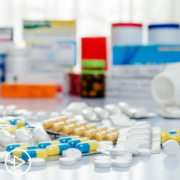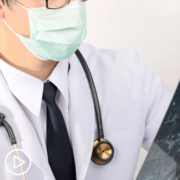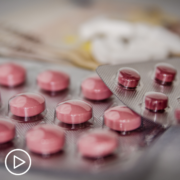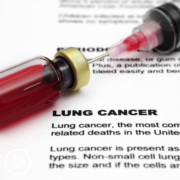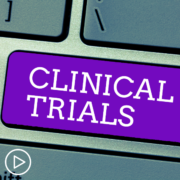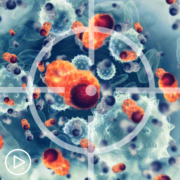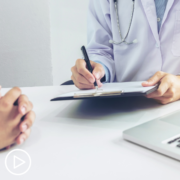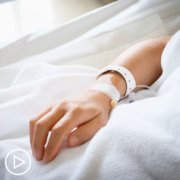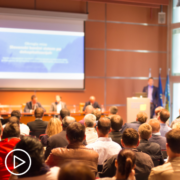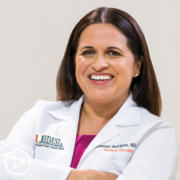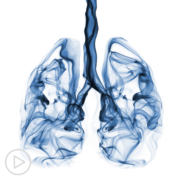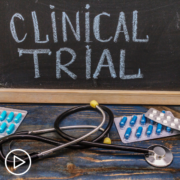How Can I Get the Best Lung Cancer Care? from Patient Empowerment Network on Vimeo.
How can lung cancer patients access optimal care? Expert Dr. Christian Rolfo from Mount Sinai and Dr. Nicole Rochester discuss the latest lung cancer treatments and research, lung cancer testing, equitable care, and patient-centered care for the best health outcomes.
See More from Best Lung Cancer Care
Related Resource:
Transcript:
Dr. Nicole Rochester:
Hello and welcome. I’m Dr. Nicole Rochester, I’m a pediatrician, a professional health advocate, and your host for today’s Patient Empowerment Network program. We are so happy that you tuned in. How can you access the best possible lung cancer care? What do the latest combination therapies mean for you? Should you consider a clinical trial as a path to enhancing your lung cancer care? This Best Lung Cancer Care program focuses on providing actionable steps to achieving equitable care and connecting to patient-centered care on your path to empowerment. We are joined today by international lung cancer expert, Dr. Christian Rolfo, Professor of Medicine and Associate Director for Clinical Research in the Center for Thoracic Oncology at the Tisch Cancer Institute. Thank you so much for joining us today, Dr. Rolfo.
Dr. Christian Rolfo:
Thank you, Dr. Rochester, for having me. It’s a pleasure to be here.
Dr. Nicole Rochester:
Wonderful. I’m looking forward to our conversation. Now, following this program, you will receive a survey and we would be thrilled to get your feedback because this helps inform future lung cancer programs we produce. Please remember that this program is not a substitute for seeking medical care, so please be sure to connect with your healthcare team regarding the best options for your care. Now, let’s delve into this very important topic, how can I get the best lung cancer care? And, Dr. Rolfo, we’re going to start with an overview of the lung cancer treatment landscape. We know that this landscape is rapidly changing and keeping up with the pace of developments could be a challenge not only for doctors, but certainly for patients and family members, so I was hoping that you could give us an overview of the current lung cancer treatment landscape.
Dr. Christian Rolfo:
In the last year, lung cancer treatment was changing radically. We have actually, including some of their new concepts as precision medicine or personalized medicine, that we have actually different therapies that are specifically for some group of patients, that they have specific alterations in their tumors. And when I’m talking about alterations I refer to mutations, genomic alterations that can be targeted nowadays with specific medications, and currently, some of them are actually, the majority of them are actually pills, for example. So it was changing radically and we are not using it like before chemotherapy for everyone. Another area of important interest was the introduction of immunotherapy, this is also an important tool for fighting cancer, and there you have a substance that are administered generally, all of them are intravenous, and this is the principle of that is to await from your own inner system, from the patient immune system, they are the tools to fight against the cancer, so it’s a very innovative way to approach cancer, and this is.
The good thing is that these two approaches targeted therapies, immunotherapy, and also still obviously the combination with chemotherapy in some of the case with immunotherapy, we can use not only metastatic patients, so in patients who have advanced disease, but also we can use in patients who have earlier stage that they were operated, for example, and we want to prevent that this patient is not going to a further process of cancer metastases, or there are several, several innovations. Then we have innovations that are coming also from local treatments and we call local treatments the one that, for example, surgery or radiation, we have new technologies also that are arriving there, and the combination sometimes with the medical treatment or systemic treatments that are going everywhere that is the description of systemic are helping these patients to have not recurrence and improving. Actually, lung cancer survival was really improving in the last years, and we are very excited by that because, unfortunately, it’s very still an aggressive disease that we were able to change with all this armamentarium the prognosis of these patients.
Dr. Nicole Rochester:
Wow, that’s a lot. I mean it’s exciting to hear that there are so many new developments on the horizon and that so much has happened just in the last year as it relates to therapy. What have we learned about drug resistance as it relates to non-small cell lung cancer? Are there any new developments in that area?
Dr. Christian Rolfo:
Yeah, obviously the patients of the…as I just commented, we have different patients with different needs and different scenarios, so we are now fragmenting a lot of the diseases and we have actually different diseases, and one big disease that is the lung cancer, so now we are treating patients in a different way. And some patients have, for example, patients who are under treatment with targeted therapies, they can develop mechanics of resistance that we can nowadays not only identify but also treat.
So we can treat and change the recurrence of these patients. One of the tools that we are using for that is liquid biopsy, for example, that is this blood draw that we are going for the patients, and actually, we are trying to do this determination from the very beginning and also monitoring the patients after we have this information to see if we are able to determine the mechanics of resistance, see also the outcomes of some of the therapies and change the treatment when it’s necessary. In immunotherapy, we have alterations that are resistant or refractory, that is another way of definitions so refractory we say patients that are not responding during the treatment and resistance of patients that or simply patients that are after the treatment having a progression in a very short time, so we need to identify these two categories and try to treat them in different ways that we have armamentarium for that as well.
Dr. Nicole Rochester:
Wonderful, thank you for that. So you’ve mentioned a lot about updates, are there any other exciting updates that patients and families should know about related to lung cancer, maybe things that are in the works that we may hear about in 2023?
Dr. Christian Rolfo:
Yeah, I said, for example, liquid biopsy I was mentioning liquid biopsy, and we are focused obviously, and in patients that have advanced disease or when they have this disease that is already confirmed. But we are now moving the tools that we have to the dedication of cancer using liquid biopsy from the very beginning, so we can use a minimal residual disease that is patients after the surgery. And I think I hear answering one of the questions that we have in the chat that this minimal residual disease is the quantity of two more that sometimes we are not able to see in the images or is very tiny, and we have equivocal information, the possibility to discover the patients that after surgery, have the possibility to recurrence or have come back of the disease is really important.
And also we are looking for early detection of lung cancer trying to identify patients with the high-risk populations that they are maybe having the opportunity to be in lung cancer screening because they are smokers, or because they have all the characteristics on top of this model that we can also use the liquid biopsy there. But one of the most important messages that I want to say, because I mentioned it here smokers and I want to remind you that we have a big proportion of patients around 20 to 25 percent of the patients that they never smoked and that they can develop lung cancer, so we have a motto, we say if you have a lung, you can have it because we want to break this stigma that lung cancer has the only patients who are smoking, obviously, smoking and tobacco are related highly with lung cancer.
Dr. Christian Rolfo:
But also we have patients that are second-hand smokers or they have other causes of lung cancer, so we need to be aware and we need to try to get attention for that because, in this special population of non-smokers, we know that there is a special characteristic that we can treat them completely different, so it’s very important that we identify those patients as well.
Dr. Nicole Rochester:
I really appreciate you sharing that, Dr. Rolfo, because as I’m sure you know, there’s a lot of stigma associated with lung cancer and the assumption that if you have lung cancer, then that automatically means that you are a smoker, and not that we know that people who smoke, those are challenges, but to just acknowledge that not everybody with lung cancer is someone who is a smoker, and also that the approach, the treatment approach may be different, so I really appreciate you pointing that out.
Dr. Christian Rolfo:
And actually Dr. Rochester, you know this stigma was causing several domino effects. We have less funding for research, we have less support from the community sometimes like other tumors have, for example, breast cancer. So if we are looking specifically in lung cancer, the quantity of women that are dying or are going to a diagnosis of lung cancer, it’s very impressive, but actually it’s killing more people sometimes than other tumors. So we need to be very careful with this stigma because we need…and this is a call for action, now we need more funds, we need more support from the community, because this is a very important area that will need research.
Dr. Nicole Rochester:
Absolutely, so that brings me to the next section of our program, you’ve mentioned a lot of these therapies already, I just want to go a little bit deeper into exploring some of the lung cancer treatment strategies and also talk about clinical trials, so you talked about bio-markers. Can you expand a little bit on that? We know that no two lung cancers are the same. Can you explain to the audience how biomarkers help with lung cancer treatment and they can be so important?
Dr. Christian Rolfo:
Yeah, we have different…as I say, we are looking at specific characteristics from the tumor when I’m referring to genomic alterations that I’m not referring to something that you can get from your family and bring to your descendants. So I’m talking about mutations that are occurring inside the tumors and only for the tumor, and so affecting only the subject that have this patient that has this alteration. So these biomarkers are an important way to identify populations that we can treat specifically, and I would like to be a little bit more specific on that. We have some of the alterations, for example, one of the mutations that we call EGFR or epidermal growth factor receptor mutation that is supported in different populations in different frequencies.
For example, if we have patients that are with an Asiatic origin, we have there the possibility to have a…and I’m referring, for example, Chinese, Japanese, this area of the East Asia, we have a hyper-prevalence of these mutations in around 50 percent of the patients with lung cancer, non-squamous we’d say this is another characteristic of the tumor can have this specific alteration. If we are moving, for example, to Latinos, the pains of the areas of Latinos they are coming from, if you have Mexican or for example, Peruvian, they have also due to their ancestry, they are similar to the Asiatic population, 40 percent we’re going to white populations and Anglo-Saxons or Europeans, they have around 7 to 15 percent according to the different regions.
African-Americans within 15 to 20 percent. So these kinds of alterations are giving us the opportunity to treat and we have nowadays inhibitors and that’s drugs that are from first, second and third generation, so we were evolving in January, this pharmaceutical in January to develop all drugs that are able to penetrate in the brain and acting not only in the tumor, but also in brain metastases. And patients who have this mutation, for example, are treated in first line, in front line, or the first treatment that they receive are pills, no chemotherapy.
So for this reason, and that is something that is important because when we know that patients, when they start this journey of lung cancer diagnosis before they see an oncologist, they were struggling to get the diagnosis and then we’re passing through several doctors from the general practitioner or to the emergency room, going to CT scan and then a biopsy then a pulmonologist until they get the diagnosis, it’s a big period of time sometimes that we are very nervous because we want to each patient to have a treatment as soon as possible, and sometimes when they arrive to us, we say they need to wait until we have the results of these biomarkers.
So it’s difficult to understand, I put in the place of the patients and the families are really difficult to understand that I was passing a lot, I went here, I came here and I want your treatment right away, but this period that we are asking to wait is really important because we will have information that can change radically the treatment and the history of these patients. So one of the problems that we have in America is the lack of testing, so we have all the tools to test the patients, but if we are looking at some of the statistics, 50 percent of the patients have been tested…39 percent if we are moving to groups, for example, of African-Americans, so we need to be very careful that don’t push to get the treatment very quickly without having all the elements to this thing, which kind of treatment is the most adequate for the patient.
Dr. Nicole Rochester:
That is such important information, and I really appreciate that, I appreciate it. That you put it in the perspective of the patients and family members. And that grueling, long wait, long time to diagnose this, and finally you’re in front of a specialist and the perception is that, Okay, now I’m going to get this treatment that I need, and then like you said to hear, now you have to wait a little bit longer, but also to understand that that wait is important to make sure that you get the treatment that is meant for your specific type of cancer, I think that is so incredibly important.
Dr. Christian Rolfo:
And believe me, we are trying to push as well from the that there are unfortunately technical times that we cannot overcome that are for testing and for having these results, and we can do that by like I said liquid biopsy, but also tissue biopsy, so we are sending the tissue that the patients gave for a biopsy in a biopsy or in a resection when they have surgery. We take these small biopsies and we send them for analysis and take longer sometimes, so it’s a pity, and we know but it’s the only way to go for the right treatment.
Dr. Nicole Rochester:
So with regard to the biomarkers, you mentioned that these are kind of unevenly distributed among different populations depending on your origin, and so how does that play into the progression of the disease, what do we know about why patients with specific biomarkers have a different degree of disease progression?
Dr. Christian Rolfo:
Yeah, so we know more or less that the characteristics, I mean more or less in terms of the evolution of the clinical characteristics of these patients, in terms of organ affection in case of progression, but what is most important of this is that we are able to continue to identify, and I say monitoring these patients with liquid biopsy for example, this is a good tool to understand or to understand it a bit better, which kind of mechanistic involvement. So because we have, for example, patients who were receiving the case that I was discussing before EGFR mutations and they received one graft from the very beginning, a third generation TKI is the one that is approved for the first line, and this patient has a progression.
The possibility to have a mechanism of resistance is different, so we can have mutations that are coming in the same pathway, so in the same area, same kind of mutation, but different location, just to the people understand is the kind of line and we have the mutation that is here, the one that we are attacking, but we have another mutation that is in this area and it’s not covered by the track that is covering this mutation.
Dr. Christian Rolfo:
So we have nowadays drugs that are going to, in this area in clinical trials, or we have in other cases other areas of the task of mutations that have nothing to do with the original one. So we are activating another kind of pathway, or we are transforming the tumor from one kind of tumor to another kind of tumor, so for this reason, identify which kind of mechanism of resistance is in place can have an important or have important implications for how we are treating these patients, so we need to look at that to treat the patients.
Dr. Nicole Rochester:
Wonderful. And speaking of resistance, we know that there are some patients who end up trying multiple therapies in order to treat their lung cancer, are there alternative treatment strategies for lung cancer patients who have failed all therapies?
Dr. Christian Rolfo:
Yeah, absolutely, we have research in lung cancer is never stopping in oncology generally, but in lung cancer it’s really exciting to see how this research is evolving and it’s arriving to the patients the meaning of the research when we are doing access to the patients, to the discovery of the finding that we have, and obviously, we have strategies in the clinical practice, but also we have the clinical trials. So clinical trials, and that is something we need to try to define very well because some patients believe that when we are going to clinical trials there are no more options or we don’t have any other options to do. We are sometimes using clinical trials even in the first line, so even in patients that are for the first time being treated.
Because we know that some of the cases we are treating patients with from some standard of care and using drugs on top, we want to explore it, we can improve these outcomes that we already know. That could be also a clinical trial, that is also a clinical trial. So don’t take the participation in a clinical trial as the last option that you have, sometimes you will go to your doctor and the first time that you see a doctor for your first diagnosis, they can propose a clinical trial.
And this is really valuable. What we really appreciate is the collaboration of the patients to be in clinical trials, because we need to remember that the drugs that we are using today were analyzing other patients before, so the treatment that you are receiving in a standard of care today were before a clinical trial, it’s really important how we can interact with the research and the clinical practice very easily, so we have also some options that are…for what we call early drug development, that there are some drugs that are in patients who are receiving the standard of care, and they have the opportunity to be treated in new drugs, and you can discuss…believe me there, and
I know that there is a lot of questions about clinical trials but the clinical trial setting is really restrictive, it’s very well-coordinated, so you would be part of a very coordinated and structured things that they try to protect the patients in the first instance, and try to understand also how we can help the patients and the future generations. So that is really why we appreciate patients, that the contribution of patients that are giving to this clinical research because it’s helping to advance the knowledge for the new patients as well.
Dr. Nicole Rochester:
And I really appreciate how you described clinical trials, and particularly your distinction about it’s not always this last-ditch effort that sometimes you all are using clinical trials as first line therapy. One of the common things is that clinical trials are tomorrow’s medicine today, and helping patients and families to understand that there’s value in being involved in clinical trials and that…and I think with COVID there’s a little more understanding, but certainly, we have a long way to go, and so I appreciate you sharing that. Do you have any specific examples of patients in your practice, and not names of course, but examples of…that have benefited from clinical trials?
Dr. Christian Rolfo:
Absolutely, we have several of examples and actually FDA was doing a terrific job in the last year to try to get access quickly access to the drugs for patients, and some of this access that was granted was based in clinical trials that we’re starting for a phase one or phase two trials, so we are really doing a very rapid evolution of the drug development, and this is a revolution actually of the drug development because we have access very quickly. I can tell you that it was certainly in my career, several patients in clinical trials that they got benefits. Obviously, clinical trials are answering questions, so that is the way that we can answer questions scientifically and is the only way that we can advance in clinical therapeutics.
Dr. Nicole Rochester:
Wonderful. So I want to move into treatment access, we’ve talked a little bit today about some of the differences that we see in lung cancer with regard to the biomarkers, you and I know, and I’m sure that was in the audience, know that health disparities are widely reported here in the United States with really any all conditions, including lung cancer. So I’d love for you to talk a little bit, Dr. Rolfo about some of the challenges related to appropriate access to lung cancer care as it relates to different socio-demographic populations, and then how can we begin to address those disparities.
Dr. Christian Rolfo:
Yeah, this is a topic that is really in my heart because I was coming with you before we start the communication, the recording of this. I was working in Europe before coming to the United States. I was shocked by the disparities that we see in some healthcare situations, so in my position before in Europe, we have a healthcare system that discovering for patients and we have, obviously, difficulties, but here I saw in some communities really underserved in terms of access to different service and healthcare is one of them. So we need to be conscious about that when we have patients that are struggling to get transportation, we have patients that are struggling to get approval for some drugs.
So, there are a lot of areas that need to be addressed, disparity also in terms of language, we have also patients that are not understanding the doctors, we have patients that are having difficulty when to get to the app information when we are saying, “Oh, you can see your report in your app,” so it’s not easy for some of them, we have generational gaps as well, these are disparities as well. So taking or being conscious of all these factors is making us take action and how we can take actions in our institutions, and in several institutions in the country, we have the support of an experienced team that is addressing that and teams are specific that are working for disparities. Some of them are social workers, some of them are advocate patients, so we have a big team of institutions that are helping to the patients to go for different scenarios, and even we have patients that are homeless, so how we treat patients in these conditions when we know that the patient is in a shelter, so if you have toxicity, what will we be doing.
So all these things are taken into consideration, believe me, because it is like New York, you have a big disparity of or a big diversity, and we say of populations in one consultation morning, you can see all of them in your waiting room, so we need to try to address all this, and there are politics that are coming from us as a healthcare system, but there are also politics that they need to come from governmental politics, so try to use these…all the tools that we have at our disposal are important, and also we have a very good support of advocacy groups.
Dr. Christian Rolfo:
And this is something that I want to really profit their patient to say thanks because we have several, several advocacy groups that are doing a terrific job from testing to helping patients to go through this journey. So it’s really an important job, and obviously families, families are helping to these disparities and patients, so patients themself. So what I say always to the patient, raise your voice, empower yourself.
Try to ask for your rights if you don’t understand your doctor… Ask again, if you want to have a second opinion, talk to your doctor, that is the most important thing. We are very open to help the patients, and that is our mission. So if I say to my patients, If you want to have a second opinion, please let me know, and I try to direct you to somebody who is an expert in the field and can help us to learn better your disease or your treatment, but I think it’s a situation that everyone is winning, especially the patient, but also ask for future patients understanding better every case.
Dr. Nicole Rochester:
Well, as an independent patient advocate, myself, Dr. Rolfo, I always get super excited when physicians like yourself are talking about and emphasizing the importance of patients and families advocating for themselves, so I just want to reiterate a couple of things that you said just to make sure that our audience heard it very clearly and asking questions is one of the things that you said that is, I believe one of the most important ways that we can advocate for ourselves and for our family members in healthcare settings, and I really appreciate that you offer advice around second opinions.
A lot of people feel that they are sending their doctor if they ask for a second opinion, but a confident doctor like yourself and a good doctor is going to encourage that, particularly if the patient or family just needs that extra reassurance, so I just really appreciate that you brought that up. Before we wrap up, there are a few questions from our audience that I would love to present to you, and so one of them comes from MacKenzie and MacKenzie asked, can you speak about MRD testing and what that means for lung cancer?
Dr. Christian Rolfo:
Yeah, and that we were discussing briefly. So minimal residual disease is the… As I say, when we have an operation, we can have the opportunity to have completely resected a tumor, but we don’t know more than with the CT scan when the patient will recover. So we are without an answer believing every follow-up visit what has happened, seeing if it has gone). So we are trying to reduce this…reduce the anxiety first of all, to try to get the tools that are able to identify patients that they can recurrence, have a recurrence so liquid biopsies, one of them, and we have now the several methods that are trials and several data coming that there are some companies that actually they are a market for some of the options, we are still having validations, required validations, but we will certainly be there very shortly in time to identify these patients and to treat them in the proper time.
Dr. Nicole Rochester:
Wonderful, and I think you just addressed a question that came in from Herald, which was is liquid biopsy playing a role in monitoring disease recurrence in lung cancer?
Dr. Christian Rolfo:
Sure, we are actually tailoring treatments and checking the patients, and I have several, several experiences in patients that they’re monitoring over the time, and we have actually some of the vendors that are proposing this approach monitoring, liquid biopsy is a great tool because it’s minimally invasive, it’s just a blood draw and we can continue. Not all the patients have the possibility in terms of they are not all cheaters, that is something we need to know DNA, so it’s the majority of them, we can do it in some minimal proportion, we cannot do it when there are also possibilities to follow them.
Dr. Nicole Rochester:
Excellent, and our last question from the audience comes from Laura, and she wants to know, “Are immunotherapy combinations in the metastatic setting, expanding to treat earlier stage lung cancer?”
Dr. Christian Rolfo:
Yeah, absolutely, we have actually an FDA approval for us, one of the immunotherapeutic drugs in patients after the resection of the disease with some characteristics, but we are there and actually we are having more and more clinical trials using in earlier stages so we will say in the other stage from the earlier stage from that is the neoadjuvant and we call that when we are doing a treatment to reduce two months to be operated later on, so we have also some trials that are going there, but we have an approval already for the adjuvant setting that is after the surgery in some patients.
Dr. Nicole Rochester:
That’s wonderful. You’ve given us a lot of good news. A lot of hopeful news, Dr. Rolfo, it is time for us to wrap up. I want to thank you again for being here for sharing your expertise. In closing, is there any takeaway that you want to leave with our audience today regarding lung cancer and advocating for themselves.
Dr. Christian Rolfo:
I will say that, first of all, thanks for the opportunity and it was a pleasure to discuss with you and I’d write to the population and say, Try to ask for your rights as a patient, so ask for your rights, be proactive in terms of your disease, you are the main actor here, we are tools of trying to help you to arrive to the destination, but the good important thing is to create a good relation with your doctor, and to create a good relation with your doctor is part of the trust from both sides, so having an open communication… Open communication with the family as well. Sometimes we are smuggling or hiding things as a patient for our families to don’t help them, and vice versa that is not helping in this process, absolutely. And if you want, if you have that asking if you’re never deserving, so this is what we are here and all the team is here to help you.
Dr. Nicole Rochester:
Wonderful. Well, I just want to echo what Dr. Rolfo said about asking questions about being an active member of your medical team, the doctors are there to assist you, but you are ultimately the expert for your disease for your body, so I just wanna thank you again deferral for being here for sharing such important information thank you all again for tuning into this patient empowerment network program. If you’d like to watch this webinar again, there will be a replay and you will receive an email when that recording is available, and remember, following this program, you will receive a link to a survey, please fill out that survey. Let us know what was helpful so that we can serve you better in the future to learn more about lung cancer and to access tools to help you get the best care no matter where you live. Visit powerfulpatients.org/lung cancer. I’m Nicole Rochester, thank you so much for joining us.


